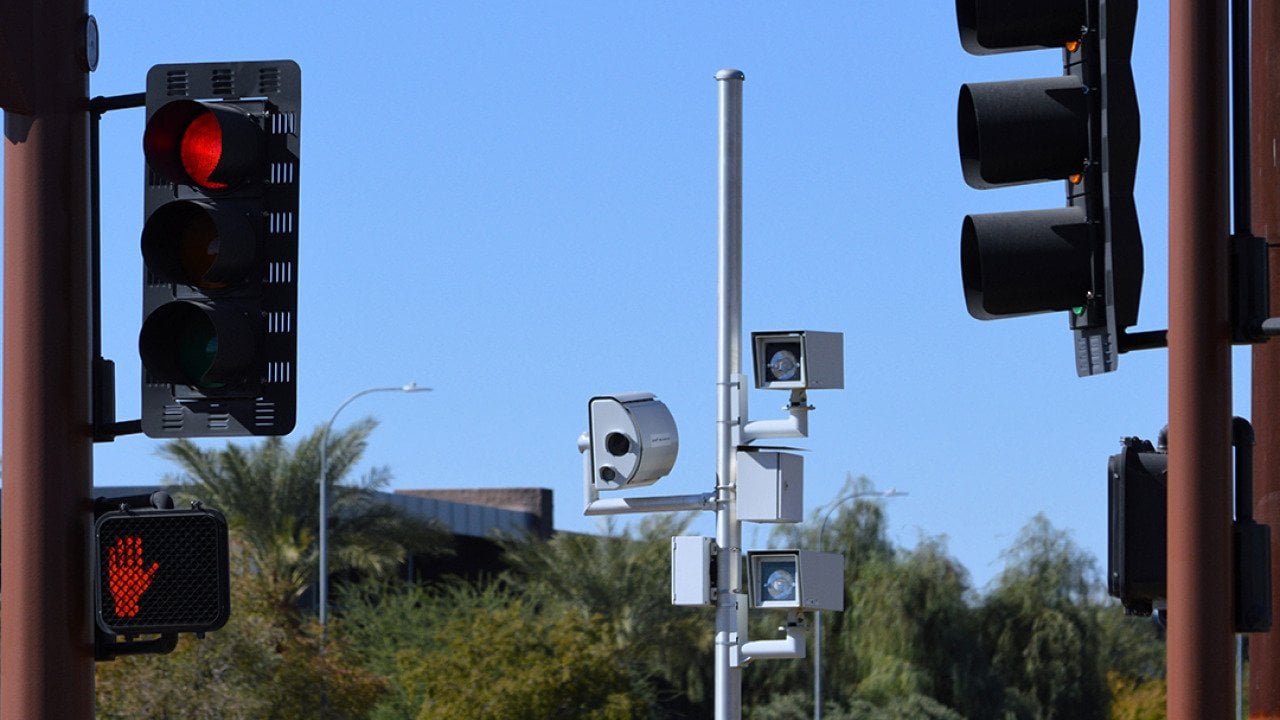Do red light tickets affect insurance?

Around the World Photos // Shutterstock
Do red light tickets affect insurance?
The complexities of a red light violation can be confusing, especially when considering the potential impact on your car insurance rates. CheapInsurance.com breaks down what constitutes running a red light, the consequences, and how it can affect your driving record and insurance premiums.
What Is a Red Light Violation?
A red light violation, or “running a red light,” occurs when a driver fails to comply with traffic signals at an intersection. This is a type of moving violation, which is a traffic offense committed while a vehicle is in motion.
Red light violations can be captured by two primary methods:
- Traffic Camera Systems: Many busy intersections are equipped with automated red light cameras. These systems capture images or videos of a vehicle’s license plate as it enters the intersection after the light has turned red. A ticket is then mailed to the registered owner of the vehicle. This is often called a photo-enforced or camera ticket. Currently used in 22 states and the DIstrict of Columbia, the United States Department of Transportation has established operational guidelines for speed enforcement camera systems.
- Police Officers: A police officer can also personally witness a driver running a red light and initiate a traffic stop to issue a ticket.
Key actions that constitute a red light violation include:
- Failing to Stop: Entering an intersection after the light has turned solid red.
- Running a Red Arrow: Failing to stop at a red arrow specifically governing turns.
- Failing to Yield: Not yielding to pedestrians or other vehicles while making a turn on a green or red light (where a right-turn-on-red is permitted).
- Not Stopping at a Flashing Red Light: Treating a flashing red signal like a stop sign and failing to come to a complete stop before proceeding.
The Consequences of a Red Light Ticket
The repercussions of running a red light vary significantly by state and local jurisdiction. However, the consequences typically involve a combination of the following:
- Fines: Fines can range from under $100 to several hundred dollars, often increasing for subsequent offenses or if the violation occurred in a school or construction zone.
- Points on Your Driving Record: For most moving violations, including running a red light, points are added to your driver’s license. Accumulating too many points within a certain period can lead to a driver’s license suspension. The number of points and the time they remain on your record differ by state. For example, a violation might stay on your record for three years.
- Traffic School: In many states, you may have the option to attend traffic school to dismiss the ticket, prevent points from being added to your record, or both. This is often available for a first-time offense.
Important Note: It’s crucial to check your state’s specific laws regarding red light tickets, as some states treat photo-enforced violations differently from those issued by a police officer. In some cases, camera tickets are considered civil violations (like a parking ticket), which may not add points to your driving record.
How a Red Light Violation Affects Your Insurance Rates
The effect of a red light ticket on your car insurance premium depends on several factors, with the most significant being whether the violation appears on your driving record.
- Moving Violation vs. Non-Moving Violation: If the red light ticket is classified as a moving violation and results in points on your record, insurers are more likely to increase your rates. This is because they see a moving violation as an indicator of risky driving behavior. In contrast, a non-moving violation (like a civil ticket from a camera) may have little to no effect on your premium, as it doesn’t imply a higher risk of an accident.
- Your Driving History: A single red light violation might not dramatically impact your rates, especially if you have an otherwise clean driving history. However, multiple violations or a combination of different tickets can signal a pattern of unsafe driving, leading to a more substantial rate increase.
- State Regulations: Insurance companies operate under state regulations, which dictate how they can use a driver’s record to calculate premiums. Some states have stricter rules on how long a violation can affect your rates.
- Your Insurance Provider: Each insurance company has its own underwriting criteria. Some providers may be more lenient with a first-time offense, while others may be more aggressive in raising rates. It’s always a good idea to shop around for auto insurance quotes after a violation to see how different insurers would handle your new driving record.
Frequently Asked Questions (FAQ)
Q: Can I fight a red light ticket?
A: Yes, you can contest a red light ticket in court. The process typically involves pleading not guilty and presenting your case to a judge. Common defenses include disputing the accuracy of the camera, proving the ticket was sent to the wrong person, or showing that a genuine emergency prevented you from stopping.
Q: Will a camera-issued red light ticket increase my insurance?
A: It depends on your state. In many states, a ticket issued by a camera is a civil penalty and does not add points to your license or appear on your motor vehicle record (MVR), so it won’t affect your insurance. However, some states may classify it as a moving violation that can impact your rates.
Q: How long does a red light ticket stay on my driving record?
A: This varies by state. In general, a moving violation remains on your driving record for a period of one to five years. After this period, it may be removed, and your insurance rates could potentially decrease.
This story was produced by CheapInsurance.com and reviewed and distributed by Stacker.
![]()



